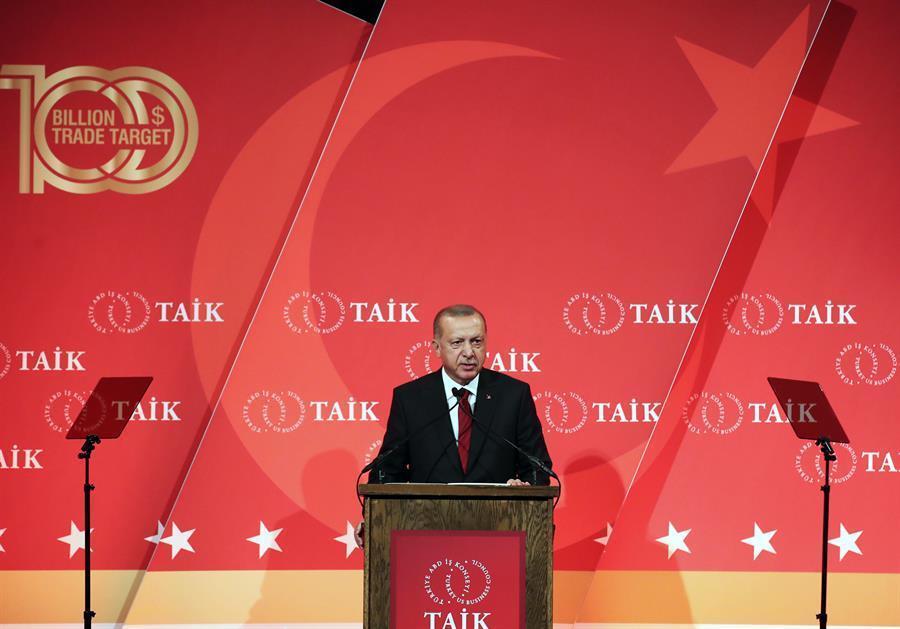
Turkish President Tayyip Erdoğan urged caution over blaming Iran for a Sept. 14 attack on Saudi Arabia's oil facilities, adding that it would not be right to place the entire burden on the Islamic Republic.
The United States, European powers and Saudi Arabia have blamed the attack on Iran, instead of the Yemeni Iran-aligned Houthi group that claimed responsibility. Iran distanced itself from the attacks but said it was ready for "full-fledged" war.
"I don't think it would be the right thing to blame Iran," Erdoğan said in an interview with Fox News broadcast on Sept. 25, adding that the attacks came from several parts of Yemen.
"If we just place the entire burden on Iran, it won't be the right way to go. Because the evidence available does not necessarily point to that fact," Erdoğan said, according to a translation of his comments broadcast by Fox.
Saudi Arabia is in consultation "with friends and allies about the next steps to take," its Minister of State for Foreign Affairs Adel al-Jubeir told reporters on Sept. 25.
The attack on the heartland of Saudi Arabia's oil industry damaged the world's biggest petroleum-processing facility and knocked out more than 5% of global oil supply.
Turning to U.S. sanctions on the Islamic Republic, the president said there is no point to them.
"We are here today and gone tomorrow. Specifically, we are neighbors with Iran, and I know that sanctions never solved anything," said Erdoğan.
The president also rejected an allegation by U.S. newspaper The New York Post claiming that Turkey has been helping Iran, Venezuela and Syria evade U.S. sanctions through Turkish banks and companies.
"These are allegations voiced by a terrorist organization known as FETÖ," said Erdoğan.
"These allegations are more than wrong. These are all produced propaganda by the FETÖ terrorist organization," the president said, adding Turkish banks are in full compliance with banking regulations.
"Banking regulation transactions have always been conducted within the framework of internationally recognized principles," he added.
FETÖ and its U.S.-based leader Fetullah Gülen orchestrated the defeated coup, which left 251 people martyred and nearly 2,200 injured.

Extradition of FETÖ leader
The president said the U.S. demanded documents and evidence for the extradition of Gülen.
He said Justice Minister Abdulhamit Gül met with U.S. Attorney General William Barr in June and he spoke to President Donald Trump.
"We submitted evidence in folders, but we never got any results," said Erdoğan. "If we are strategic partners, we need to fight back together against terrorism."
The FETÖ leader has lived in self-imposed exile in Pennsylvania since 1999.
Ankara has requested Gülen's extradition from the U.S. several times. Washington has yet to move towards extraditing him.
On Turkey-U.S. relations, the president said the relations date back to a long history "built upon very strong bonds."
"Our eventual goal is to expand economic relations between the United States and Turkey and increase the trade volume between the two countries up to $100 billion."
Asked to evaluate whether Trump or Barack Obama was better in relations with Turkey, the president rejected making such an assessment.
I must say that since President Trump took office, we have been enjoying close ties and close relations," he said.
Turkey expects the US to exempt it from future tariffs
Erdoğan also said he expects the U.S. to exempt his nation from any future tariffs due to the strategic partnership between the two countries.
“I believe that the opening of the Free Trade Agreement negotiations will be beneficial in terms of achieving the targeted trade volume,” said Erdoğan, speaking on the sidelines of the 74th UN General Assembly.
Erdoğan stressed that such an agreement will primarily contribute to the development of trade and economic relations between the two countries.
“In addition, the agreement will allow Turkish and American companies to open up to the geographies of the two countries and even to develop joint projects in third countries,” he added.
Greek, Turkish leaders discuss curbing migrants
Meanwhile, Greece's new conservative prime minister met on Sept. 25 with Turkey's leader for the first time and asked for cooperation in stemming an uptick in migrant arrivals.
Prime Minister Kyriakos Mitsotakis met with President Erdoğan as the leaders of the historic adversaries took part in the U.N. General Assembly.
"I had a frank discussion with President Erdogan on all major issues from immigration to Cyprus to bilateral matters," Mitsotakis tweeted after the meeting.
"We agreed to work together to build a better climate for the benefit of our people and stability of the region," he said.
A Greek official said the two leaders "agreed to make every effort to decrease the flow of migrants."
Mitsotakis pledged to take a tougher line on migration as he defeated Alexis Tsipiras' left-wing government in July.
Turkey curbed a historic wave of migrants under a 2016 agreement with the European Union in return for $6 billion in aid.
But Erdoğan has recently pressed for more funds to take care of the more than four million refugees in Turkey, fearing a new influx due to fighting in Syria's Idlib region.